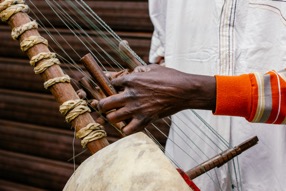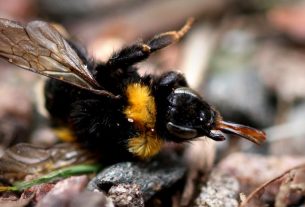The Kora, in modern music, is accompanied by local drums belonging to the Senegambian people. Young people who are inspired to learn the instrument are first introduced to the first song of the Kora, titled: ‘Kelefa Ba’, a song that has many rhythmic and melodic versions.
Many scholars have agreed that the Kora was founded after the fall of the Mali Empire. This gives the fact that the instrument has been in existence for over 200 years. Brikama, a town in the Western region of The Gambia, is accepted as the centre of Kora music, where lots of people visit to learn the instrument. Most of the great Kora-playing families are now based in Brikama.
Historically, Kora was a palace instrument that was only played for the nobles to listen to and appreciate during functions in a court of the King. Now it is different because some people play it for commercial purposes, instead of authenticity and entertainment.
After several researches by engaging relevant stakeholders within the cultural sector and families of Kora players, especially the narration of late Jali Alhagie Mbye, our medium was able to get the narration of the Kora that has been authenticated by the National Centre for Arts and Culture (NCAC) for not having reasons to doubt the history.
History of the Kora
The Kora was founded in The Gambia when Koriang Musa Suso at his younger age left Mali to find a greener pasture. He ended up in a village called Busumbala, a settlement in the West Coast Region of The Gambia, and was welcomed as a stranger. He was a handsome and good-looking man, liked and supported by the native village. He was later married to an albino named Kanku, a woman that was marginalised due to the colour of her skin. After a traditional wedding for Kanku and Koriang, the couple moved to a place within the coastal area in a forest called Sanementareng, in the village of Brufut. Sanementareng is a historic spiritual place.
The couple stayed together and depended on fishing and hunting for feeding. One day a spirit appeared in front of Kanku while Koriang was away. The spirit called Kanku, as they saw an extraordinary beauty from Kanku and believed that she belonged to them and needed to follow them to a place where she truly belongs to. The frightening woman would always explain the matter to Koriang but he wouldn’t take it seriously.
One night, the spirit appeared in a dream to Koriang playing a melodious instrument. Koriang kept wondering how to get the melodious instrument. Eventually, the spirit appeared in white in front of Koriang and played the melodious instrument. The eager young man (Koriang) wanted to touch the instrument demanding it as a tool that will keep him accompanied. The spirit promised to hand it over in exchange for someone he loves, Kanku.
He insisted but the spirit promised that Kanku would always be with him spiritually and all the spiritual knowledge of the Kora would be handed over to him. An agreement was reached in exchange for the Kora after a long moment of negotiation. The Kora was finally given to Koriang and an expression of joy reflected on Koriang’s face. The Kora is now played in many countries worldwide with a spiritual belief attached.
Testimonies of Kora players
Musa Conteh, a young kora player who used to trend around the Senegambia industrial area to entertain tourists, told this medium that he was born into a griot family, thus they have no other pride than the Kora. He added that the Kora is not for ordinary beings because it was obtained from a spirit.
Speaking on the responsibility of the government to safeguard the Gambian instrument before other countries claim its origin, he said: “A standard music school and national Kora festival should be introduced to revive the existence of the instrument to make our people follow their own culture.”
Alhagie Jali Hali Mbye, an old and renowned Kora player, in an interview with this medium, explained that in West Africa and the world at large, The Gambia is the origin of Kora and the instrument is linked to spirits.
The reason the name Kora was given to the instrument is unique and it is because of Koriang who was asked to play the instrument but couldn’t. Jali Hali, who plays the instrument at the national television (GRTS), said: “Koriang was later told that ‘Ebaa Koralaaleh’ – meaning (gather strings together), and that’s where the word Kora derived from.”
After naming the instrument, that was the time the Kora travelled to Senegal, Guinea Bissau, Guinea Conakry and Mali. Since the instrument was taken in the hands of the spirit, The Gambia is the fortunate country to have it as one of the melodious entertainment instruments. Jali Hali said further: “Now that the Kora is popular, some of the West African countries want to claim its origin.”
Mbye, who is the current president of the famous 21-string Kora group, emphasised that young people are now into music but are not following traditional music. They are instead following other beats to get money and fame.
There is an instrument made similar to the Kora by the white called ‘Guitar’ and it’s been used by many young Gambian musicians. However, Jali Hali reiterated that at a time when Kora was spreading in the neighbouring countries, people from western countries used to visit The Gambia in order to learn about the Kora. He said: “They are now making instruments like the Kora and our young people are buying them instead of learning to make their own local ones.”
Stakeholder’s view
Our medium has engaged the Director General of National Center for Arts and Culture (NCAC), Hassoum Ceesay, who explained that the Kora is a national treasure and is an instrument that requires skills, adding that somebody has to be an apprentice for years to know it well.
He said: “Some of the Kora masters spent about 12 years learning the Kora. Kora has to be embraced and young people should understand that one cannot get the skill in two days.”
For people who think that the Kora was founded in Mali, Director Ceesay stated that the Jobarteh families that play the Kora in Mali are from The Gambia, a town called Bansang. He added that the grandfather of Sidikeh Jobarteh, the current Kora star player in Mali, died in Bansang in 1997.
In the quest to add the Kora to The Gambia’s school curriculum, Mr Ceesay reiterated that the NCAC is very strong in preserving the Kora in oral archives.
“Hundreds of hours of Kora tunes from master Kora players have been preserved for posterity and people to exploit,” he said. “To introduce it to our schools, the resources are already available and a lot of efforts have been made for the study of music in the schools.”
DG Ceesay continued that all that is needed is to institutionalize a Kora festival to protect the instrument as a national heritage for economic growth.
Iconic Gambian Kora players
Many Gambian legendary Kora players made a wave in the traditional music industry in Africa, especially in the West African region, mainly Senegal, Gambia, Mali, Guinea Bissau and Guinea Conakry. Among The Gambia’s legendary Kora players are Lalo Kebba Drammeh, Madi Wulen Suso, Nyama Suso, Suntu Suso, Foday Musa Suso, Jali Alhagie Mbye, Amadou Bansang (Suso), and Tatadinding Jobarteh. The living legends include Jaliba Kuyateh, Sona Jobarteh, Santu Suso, Alhagie Jali Hali Mbye and many others.
Editor’s Note: The purpose of doing this story is to provide basic but rare authentic history about the origin of Kora, which, being peculiar to The Gambia, tends to be claimed by other countries. This research on the Kora has been painstaking but successful, and we hope it would serve as an important tool for those who intend to learn more about the Kora.



